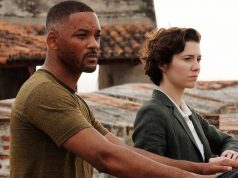One of the most technically brilliant and thematically layered films of the year, “Children of Men” is a stark, gray vision of a future without hope. How does a society respond when its outlook is irrefutably grim? And how quickly does joy return when hope re-emerges?
Based on the P.D. James novel, the film is set in the fall of 2027, when the world is in utter chaos. News reports refer to day 1,000 in “the siege of Seattle.” Governments have toppled. Anarchy reigns supreme. Only the United Kingdom has maintained some semblance of order, and that only shakily and dubiously, as the government relies on fascist tactics and a steady diet of misinformation to maintain even the slight control it has.
The cause of all this confusion? It has been 18 years since any woman on Earth has had a baby. For reasons unknown, humans have become universally infertile. First birthrates declined, then plummeted, and then, in 2009, ceased altogether. There is literally not a single child anywhere in the world. The youngest person is 18.
The link between this and the world’s chaos may seem tenuous, and the film never says specifically that the flatlined birthrate is what caused the breakdown in civilization. But the point is compellingly made nonetheless. Imagine a world without children. In the short-term, it means no schools, no playgrounds, no chance to hear the sound of children’s laughter or to watch their delight on Christmas morning. In the long-term, it means no no potential for growth, no chance for the next generation to make the world a better place. There’s truly no reason to care much about what you do when you know there will be no humans left on Earth in another 80 years anyway.
It is in this bleak situation that we meet Theo Faron (Clive Owen), an employee in the U.K.’s Ministry of Energy who is dragged into activism by Julian Taylor (Julianne Moore), his former lover and the mother of his now-deceased child. Julian disappeared years ago and now reappears as part of a radical group called the Fishes. The government has branded them as violent terrorists, and to prove the point, the government occasionally blows something up and blames it on the Fishes.
The group is actually non-violent and seeks to expose the British government’s appalling treatment of immigrants, among other things. With most other countries gone haywire, England has been flooded with refugees, but anti-immigration laws render them less than human. Illegals are hunted down aggressively and detained in Guantanamo-style barracks.
The Fishes need Theo’s help getting transport papers for a woman who needs to be taken someplace safe. Her name is Kee (Claire-Hope Ashitey). She is in her late teens. And she is pregnant.
I wish I could leave that detail unmentioned, but it would impossible to describe the urgency of the film’s second half without discussing it. (The movie’s trailer and all its advertising mention the pregnancy, as does the back cover of the book it’s based on.) Even knowing in advance that the girl is pregnant, however, it’s hard not to share in the stunned surprise when Theo discovers it. All the ramifications instantly become apparent. This girl and her baby must be protected at all costs. This birth could be the most pivotal event in mankind’s history since a certain other miraculous birth 2,027 years earlier.
The screenplay, adapted by director Alfonso Cuaron and Timothy J. Sexton, is packed with fascinating details and nuances of the dystopian future. The government encourages suicide (to keep the population down) and even provides kits to help people, yet marijuana remains illegal. Religious zealotry is on the rise. People no longer have any regard for artistic works, since the world is ending anyway.
That last point means “Children of Men” the movie would be of little interest to the people of 2027, because it’s an artistic marvel. There are at least three very complicated scenes that would take a normal director days to shoot, with multiple camera angles and careful editing; Cuaron shoots them each in one long, unbroken take. The most stunning is a lengthy sequence in which Theo rushes through several blocks of a war-torn neighborhood, dodging bullets and explosions as he goes. Blood gets spattered on the camera near the end, and you can imagine Cuaron saying, “We’re not re-doing the whole thing just for that.” The logistics of filming such a long, action-packed scene in one shot are mind-boggling.
“Children of Men” deserves praise for reasons other than technical ones, though. Clive Owen’s performance is stoic and steady, and Michael Caine is a breath of fresh air as a pothead friend of Theo’s. It’s a film full of imagination, ideas, and intelligence, completely riveting from start to finish.
A- (1 hr., 49 min.; )





